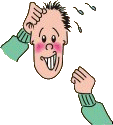

|
|
|||
| Stress Management | |||
|
What is stress?
Stress is difficult to avoid and a part of modern life. Stress not only affects those with demanding jobs, it also affects everyone from children to the elderly. The pace of our lives and modern technology all add to daily pressures, e.g. family problems, financial pressure, job pressure, noise, environment, global problems, etc. What are the effects of Stress? We all need stress; not all stress is negative, it can be stimulating but when we are exposed to long-term stress we begin to feel fatigued, anxious and depressed. Our nervous system is made up of the sympathetic nervous system, the day nerve which allows us to work, and the parasympathetic nervous system which renews our strength, helps to induce sleep, aiding digestion, repair and regeneration. When we are stressed the sympathetic nervous system becomes stronger and parasympathetic nervous system becomes weaker causing an imbalance. The nervous system becomes drained and the immune system depleted making us more susceptible to immune deficiency diseases. Complementary treatments can have a calming and balancing effect on the nervous system. Stress affects everyone in different ways, certain physiological changes take place when under stress, it can cause cardiovascular problems, digestive upsets, anorexia, panic attacks, ulcers, headaches, migraines to mention a few. Stress can also be linked to infectious diseases, when the body is busy dealing with the effects of stress it cannot be effective against invading organisms. How can I deal with Stress? It is important to identify and measure the stresses that are in your life. Many of them are well hidden. There are a variety of ways of dealing with stress including Kinesiology, Aromatherapy, Reflexology and Manual Lymph Drainage. Once your stress has been recognised it is possible to learn to manage it and to be in control again. Prevention is better than cure! What type of treatment will I need? Most patients are unsure which type of treatment they require the most appropriate treatment can be discussed at your first appointment.
|
|||
| [About this site] [Disclaimer] [Privacy] [Copyright] [Information collected by this site & cookie use] | |||
| © 2013 Jane Loader | Design by Praetorian Web Design | |||
